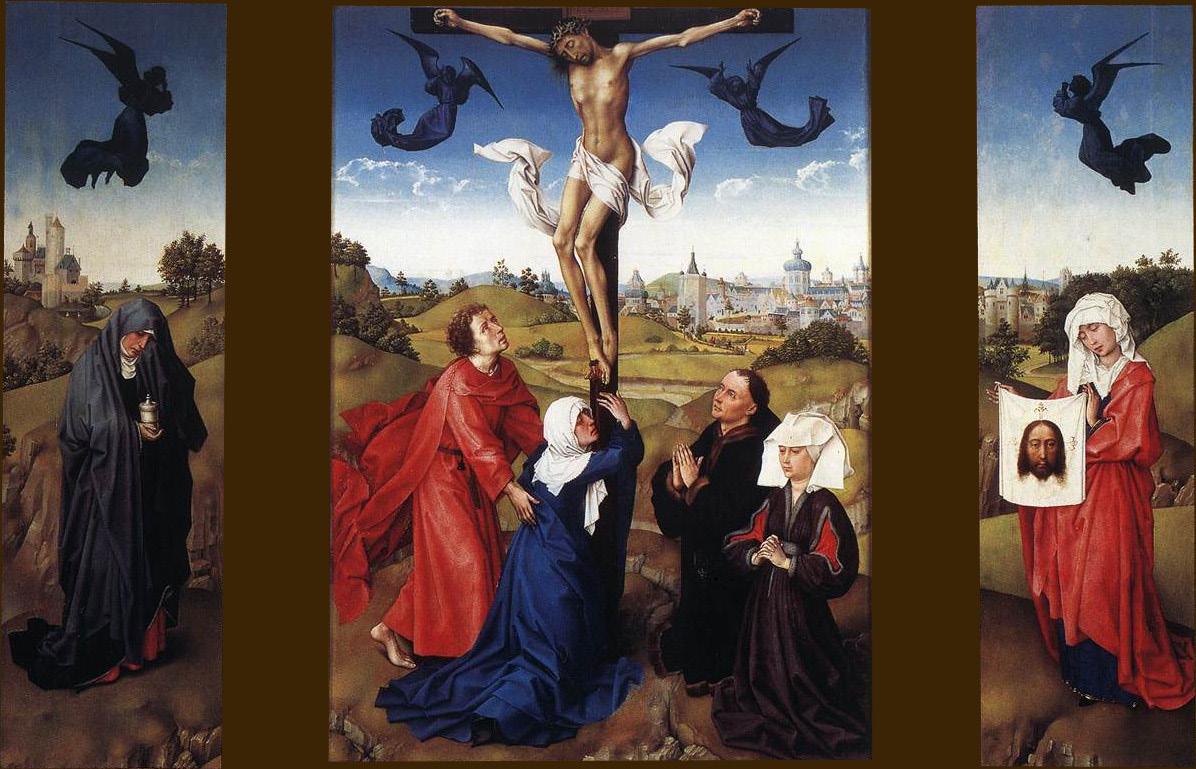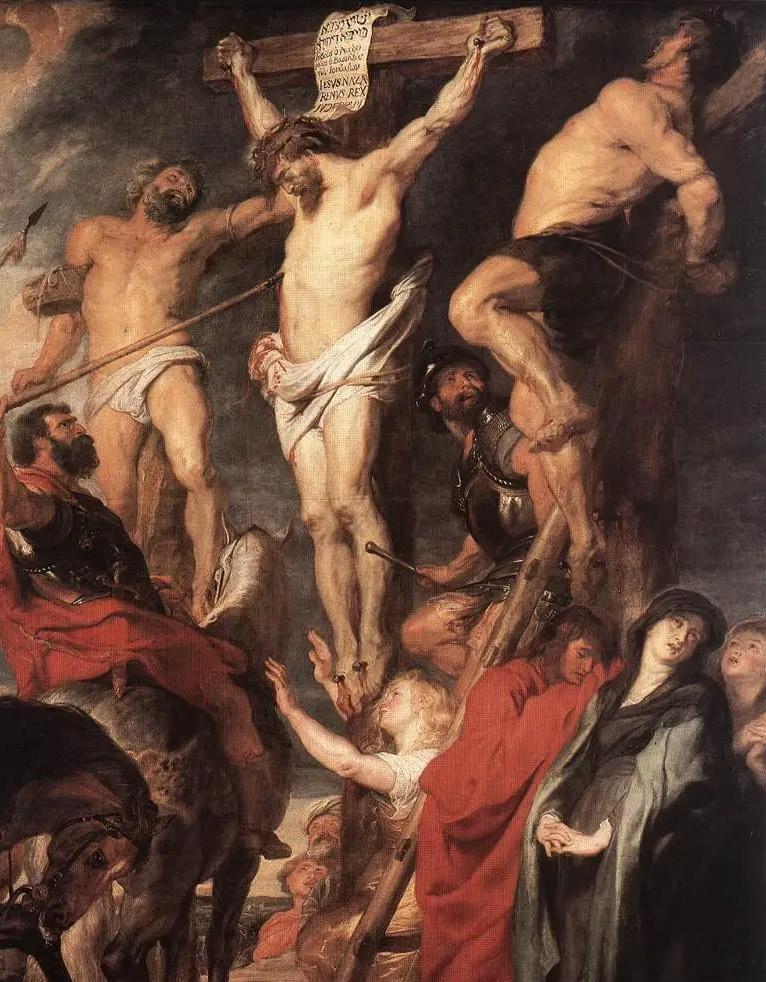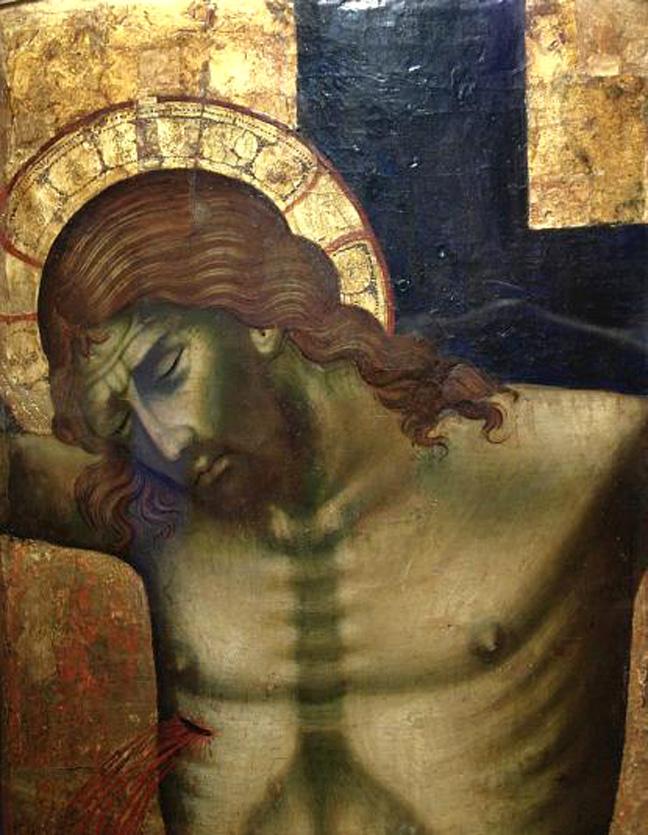
Christ the seven last words of
Resurrection is integral to our Christian faith. But you cannot have resurrection without death. There’s something quite powerful, though, about the fact that we spend a whole season of the church year (Lent) reflecting on Christ’s life and death, even while we know the Good News of Resurrection awaits us on Easter morning.
During Holy Week, we slow down even more. We leave Palm Sunday ushered into the Passion of Jesus as we take the journey, again and anew, to the cross. Our stories – yours, mine, each of ours – are entwined in that journey of Christ as Christ journeys with us today.
The seven last words (or phrases) of Christ have been used as a tool for meditation by Christians since around the 17th century. These phrases are drawn from the gospels and capture much of who Jesus was and is. Christians have used these phrases as a way to pray for others, to reflect on their own lives, and, ultimately, to approach the cross of Christ and the empty tomb in a new way. This year we invited our four Pinnacle pastors along with three pastors who worship with Pinnacle who are engaged in ministries of hospice and hospital chaplaincy and spiritual direction to share written meditations on the seven last words.
pinnacle presbyterian church
we invite you to take a journey, again and anew, to the cross.
Rev. Erik Khoobyarian
For they know not what they do. What a strange wonder it is that Jesus offers forgiveness from the cross. Not anger. Not even sorrow at this point. He offers forgiveness. It should come as no wonder, of course, as we look at the life that Jesus lived, but it still shakes me.
Even in the final days of his life, Jesus lived out the commitment to love that went beyond the failures of those around him. Even Judas shared the cup at the Last Supper. Even Judas had his feet washed. Jesus knew that he would be betrayed by Judas, he knew that he would be denied by Peter, he knew that those with power would kill him. They didn’t know what was happening and what would happen, but Jesus did know. And in his knowledge – knowing all that he knew about them and about what was happening and would happen, Jesus forgave.
I struggle with forgiveness. I struggle with receiving forgiveness and with forgiving others or even myself. When I turn and face the cross, though, I am challenged by Christ’s forgiveness of those who know not what they do. Those, like me, who know not how what we do impacts

the body of Christ and how our thoughts, actions, failures to act, and even our thoughts seem to distance us from Jesus. Father, forgive them, Jesus prays.
The forgiveness we experience in Jesus is a forgiveness that goes beyond a list of our actions, though. The forgiveness of God is a radical reconciliation of humanity to the one who created us in the divine image. Even when we do not realize how we try to distance ourselves from Jesus, or even deny, betray, or crucify Jesus, Jesus still loves, cares for, and forgives us.
Imagine today that Jesus is praying these words for you. Father, forgive them. Allow yourself to experience the forgiving love of Jesus and consider how you might live your life in a way that is transformed by God’s reconciling, radical, act of love.
father, forgive them, for they know not what they do.
the seven last words of christ
~ Luke 23:34
John teaches that “whoever believes in [Jesus] shall not perish but have eternal life.” John 3:16-17. While Jesus does not condemn the world, the condemnation of the world is vividly on display in Calvary. Jesus, condemned for claiming to be the Messiah; the two criminals, condemned for their crimes. The condemnation continues even after they are nailed up when the first criminal mocks Jesus, asking why he does not “Save yourself and us.”
The second criminal changes the focus from condemnation to salvation. “Stop,” he tells his partner in crime. We are getting what we deserve, but Jesus is innocent. He boldly requests that Jesus:
“remember me when you come into your kingdom.” Jesus responds, “Truly I say to you, today you will be with me in paradise.”
The first criminal’s suggestion that Jesus cannot save them is ironic. For that is exactly what Jesus is doing. In His sacrificial death, we are saved from sin. No matter where we are or what we have done, we are saved from the sting of death and granted eternal life.
Jesus’ words to the second criminal in the last moments of his life, seem to be about being with Jesus in Heaven. But what do these words mean to us? Taken literally, when we accept Jesus into our hearts, will we
be with him in paradise – “today”? Jesus often spoke of ushering the Kingdom of God into the world. Are we changed by our belief in Jesus, living life differently than before, loving others as we love ourselves, ministering to those whom the world condemns? That sounds like being with Jesus today, laying one brick in the process of bringing about the Kingdom of God. Yes, Paradise.

truly, i say to you, today you will be with me in paradise.
pinnacle presbyterian church
Ben McConaughy
~ Luke 23:43
woman, behold your son ... and to john: behold your mother.
Rev. Margo Walter
Meanwhile, standing near the cross of Jesus were his mother, and his mother’s sister, Mary the wife of Clopas, and Mary Magdalene. When Jesus saw his mother and the disciple whom he loved standing beside her, he said to his mother, “Woman, here is your son.” Then he said to the disciple, “Here is your mother.” And from that hour the disciple took her into his own home.

This year the Ignatian tradition, encountering scripture through imagination, has given Jesus’ last words new life for me. Imagining myself in this story, I watched Jesus, gasping out his last, barely audible, words to order Mary and the Beloved Disciple into a radical new relationship as family. I watched myself cry, “Why?” As a mom, I wanted Mary’s other sons to care
for her. Dale Bruner, in his John commentary, argues that Jesus forms Mary and John into “the nucleus of his New Family, the Church” (p.1108).
Maybe Mary visited her family later, since Jesus doesn’t obliterate our relationships with our family of origin or the family we create. (We actually specialize in that.) But her new Family is bound by faith in Jesus as God’s son, not DNA.
Imagine your own family. Has death, division or despair torn it apart? Or is it a source of life and joy? Either way it’s not enough to sustain us cradle to grave. Bruner offers a new way to imagine the church: as Family. This Family shares an origin story of a Crucified Jesus who dies and returns on Easter to breathe out Spirit on his fearful and confused Family
members. Church is not a building or campus, not a denomination, maybe not inhabited by only Christians. It’s a Family like the un-torn robe raffled off as Jesus died, where I’m woven together, with others, by indestructible love- threads by Holy Spirit.
Imagine with me this Easter Sunday’s grand scene: One Big Family, gathering at Table across the globe over 24 hours, to remember Jesus and to eat and drink, then heading out to sit at millions of earthly tables, bringing Christ’s Living Spirit into the midst, hoping to be a blessing. Maybe even to our own family. Imagine that!
Rogier Van der Weyden ca 1445
the seven last words of christ
~ John 19:26-27
my god, my god, why have you forsaken me?
~ Matthew 27:46
Rev. Leah Quarles
Charlie Brown once said, “Sometimes I lie awake at night, and I ask, ‘Where have I gone wrong?’ Then a voice says to me, ‘This is going to take more than one night.” What keeps you up at night? For children it’s a head cold, the monster under the bed, or a nightmare. For adults, it might be a mysterious illness, worrying about robbers or an argument robs you of sleep. Perhaps a nightmare jolts you awake. Maybe life in the daylight is worse than any nightmare.
The content changes, but the fears remain the same. Underneath it all is the fear of being alone or abandoned. Unlike Charlie Brown, when there is
no answer to your cry, do you wonder where God is?
“My God, my God, why have you forsaken me?” God hears this prayer. God answers this prayer. And God says this prayer.
Out of the darkness of a Friday afternoon, this cry went up from the wood of the cross. Why did Jesus cry out? That cry reveals the heart of God. God is not distant. God drank the cup of suffering and death. Where is our God? Wherever there is pain and affliction. But God does more than just feel your pain.
When Jesus cried out in the dark to God, all the sin and suffering of this dark world was no longer between God and humanity. For that one, horrific moment, it filled the Son so that the Creator had to turn away. But there, between God and Jesus, in the very heart of God, the power of sin and death was destroyed forever.
If God let Jesus endure that for you and me, you can trust God will be at your side when you cry in the dark.

pinnacle presbyterian church
the seven last words of christ
 Peter Paul Rubens, Seventeenth-Century Flemish Baroque painter
Peter Paul Rubens, Seventeenth-Century Flemish Baroque painter
i thirst.
Being an On Call Chaplain, I am frequently paged or called to rooms where family members and friends do not want to believe that their loved one is about to die. But if their loved one is still conscious and can speak and listen, this time becomes precious, sometimes life altering for those present in the privacy of the room.

Jesus is deeply aware of who is there with him: his mother Mary, two other women, and John. Jesus is experiencing what any person experiences when they are still conscious while dying: agony in bodily, mental, and spiritual separation from the ones they love.
Jesus’ “cry” is mistaken as bodily thirst. Jesus is offered false comfort by his executioners. His loved ones are helpless and powerless.
That’s why modern medicine offers “comfort or hospice care” for those who are dying. It is also why spiritual/emotional support is so essential for those still living but are experiencing deep grief.
Jesus’ cry, “I thirst” is his spiritual longing to impart a legacy that will satisfy those he loves. Jesus’ legacy was expressed in the Sermon on the Mount, as I interpret it, “Blessed are those who thirst for God’s good character and seek just relationships, for they will be filled/satisfied.”
Legacy is more than an estate plan for our family. Legacy is the most important expression of our character and good relationships that demonstrates our love for God and our neighbor.
For what do you thirst? What do you want your legacy to be?
In my view, the “Seven Last Words of Christ” are the sum of Jesus’ spiritual legacy to those who love him and for any who seeks wisdom for their living.
pinnacle presbyterian church
~
Rev. Dr. Bob Claus
John 19:28
We have all most likely seen images or footage of a person striving to finish a marathon, only to collapse from exhaustion within yards of the finish line. The best stories include someone else, set to race to the end to beat their own time, suddenly changing course, noticing the fallen runner, stopping to help them up, and sacrificing their own time, to help that person to cross the finish line, with crowds cheering this magnanimous display of the best of the human spirit.
When we look at the scene of Jesus on the cross, believe it or not, we see something similar, though at first it might not be clear. Seeing the “marathon” all depends on Jesus’ last words, “It is finished.” We could translate this as, “I have reached the finish line” without too much of a stretch. We see Jesus exhausted beyond exhaustion, depleted beyond depletion, struggling to take his final breaths…to endure to the end. A few hours earlier, someone had helped Jesus walk the desolate road to Golgotha: Simon of Cyrene, who was compelled to carry Jesus’ cross. And now, alone in his agony, except
for two thieves alongside him, and the jeering crowds condemning him, Jesus says something that is utterly personal and yet cosmic in scope, “It’s over.” Or did he say, “It has all been fulfilled”? It’s hard to know what Jesus really meant. He didn’t have time to explain. Moments later he “handed over” his spirit, expelling his last breath. And he died.
When Jesus crossed this finish line, it’s nearly impossible to catch any refrain of victory. When he dies, he truly dies. It feels like everything that God was seeking to do in Jesus’ life and ministry had just been obliterated. But we who know the rest of the story, know that this isn’t the end. Those of us who follow this Jesus are called to join the race, and by God’s grace to endure to the end, so we can join the Apostle Paul in saying, “I have fought the good fight; I have finished the race; I have kept the faith.”

it is finished.
Rev. Dr. Michael Hegeman the seven last words of christ
~ John 19:30

pinnacle presbyterian church
Paolo Veneziano, -approx. 1362 National Museum, Kraków
father, into your hand i commend my spirit.
~ Luke 23:46
Rev. Dr. Wes Avram
As in others of Jesus’ words from the cross, our Lord quotes scripture. Here his words are from Psalm 31. Jews hearing might find the flow of the psalm come back to them–as if completing the sentence in their hearts. Like the words of a song, one line that evokes the whole thing. Like the “tok” you say when I say “tik.”
Psalm 31 is a song of deliverance. The singer laments their position, feeling put upon by life, hemmed in by circumstance, threatened by enemies (natural or human) who seek to undo them. The singer is in distress.
We don’t need to be directly attacked to feel this way. There are times when we feel vulnerable for many reasons, or out of control, or on the edge of something that will happen whether we like it or not–even death.
In those moments our salvation might not be in changing things we can’t change, but in seizing the one act of freedom that can never be taken from us, the one word our spirit can speak even when our mouths make no sound or our minds shape no thoughts. We can give our spirit to the One who made it. We can give ourselves to God.
contributors
Pinnacle Pastoral Staff
Rev. Dr. Wesley Avram
Senior Pastor/Head of Staff
Rev. Erik Khoobyarian
Executive Associate Pastor
Rev. Dr. Michael Hegeman
Associate Pastor in Education
Rev. Leah Quarles
Associate Pastor for Family Ministries & Congregational Life
Ben McConaughy Spiritual Director
Rev. Margo Walter Ordained Minister & Spiritual Director
To commend our spirits to God is to stake a claim against destruction, and against despair, and against the demonic. It’s to remember who we are, and whose we are, and be the freest person we’ll ever be—even when we feel the opposite. It’s to be delivered back to ourselves and over to God. It’s to refuse the power of death, even when death itself (or other things we can’t control) might still come. It is to lay the groundwork for Resurrection.
Rev. Dr. Bob Claus Board Certified Chaplain who has served at St. Joseph’s Hospital and Barrow Neurological Institute since 2018. the seven last words of christ






 Peter Paul Rubens, Seventeenth-Century Flemish Baroque painter
Peter Paul Rubens, Seventeenth-Century Flemish Baroque painter


